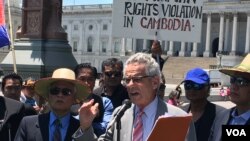A year after a group of U.S. Congressmen created the Congressional Cambodia Caucus, its founders say that their mission, to educate their fellow members about the developing political situation in Cambodia, has broadened their understanding of Cambodian affairs.
Representative Alan Lowenthal, co-chair of the Caucus, said the group was pleased that “everyone in the House of Representatives now understands that there is a very serious political situation taking place in Cambodia.”
“And the United States is encouraging the Cambodian government to rectify the situation and allow free and fair elections as they agreed back in 2013.”
The Caucus was created on March 21 last year by Democrat Congressman Alan Lowenthal and Republican Congressmen Steve Chabot.
Cambodian politics changed in 2013 when the newly formed Cambodia National Rescue Party secured 55 of parliament’s 123 seats, bringing the ruling Cambodian People’s Party majority down from 90 to 68.
Next year’s general election is shaping up to be a bitterly fought contest, as critics say Prime Minister Hun Sen has for months sought to lay the foundations for another CPP win by using the courts, pro-government media, and legislation to discredit and disrupt the opposition.
Hun Sen has even taken the extraordinary step of leaking a private phone call between himself and the opposition’s then-deputy president, Kem Sokha, in which he suggests that legal proceedings against Sokha would disappear if he were to publicly attack the former party president, Sam Rainsy.
Rainsy resigned from the party leadership in February after Hun Sen passed amendments to the law governing political parties that made it illegal to hold a senior position in a party with a criminal record. Rainsy was convicted several years ago of defaming a former foreign minister, Hor Namhong, which meant if he had stayed in his position the interior ministry and Supreme Court would have had the power to dissolve the CNRP.
Hun Sen, however, has denied he is attempting to sow division in the CNRP.
Lowenthal said the recent developments were a step too far.
“It’s at a critical point now,” he said. “The point is what can the United States do? We’ve now informed the secretary of state. This past week, I’ve heard conversations with the Asia desk of the secretary of state to talk about the deteriorating relationship.”
He added that the Caucus would soon meet to hammer out a strategy.
“It’s very serious ... there is definitely an overt attack now by the Prime Minister, Mr. Hun Sen, against the CNRP being able to be a viable political opposition,” he said.
Analysts and activists said Hun Sen’s leaking of the phone call with Sokha was a clear attempt to divide the CNRP.
Navan Cheth, a community organizer in Long Beach, CA, said: “Even a three-year-old kid understands that this is a cheap game and it is a set up that the majority of Khmers in and outside of Cambodia cannot accept.”
In September, the Caucus lobbied for the adoption of House Resolution 728, aimed at promoting human rights in Cambodia. Cheth said this was a “legal weapon” the Cambodian people should use ahead of the elections.
“If someone wins the election, the winner will get a peaceful hand over of power without any war, [but] as we have already witnessed in Cambodian history, there is no transfer of power without shedding blood,” he said.
Yaing Saing Koma, founder of the Grassroots Democracy Party (GDP), said the United States still had a crucial role to play in promoting human rights in Cambodia. “The US has a role and obligation to ensure that Cambodia properly implements the multi-party policy, which means to conduct a free and fair election,” he said.
The GDP will compete for the first time in the June 4 local elections.
Saing Koma said initiatives such as the Caucus would “give a warm assurance to the Cambodian people who will feel that the international community has not abandoned them yet. There are still people who pay attention to political developments in Cambodia.”
David Josar, U.S. Embassy deputy spokesman, said: “We support an open and transparent political process that represents the will of the people.”
“The Embassy, through USAID, has been supporting the National Election Commission (NEC) and civil society organizations on election preparations, in cooperation with international partners. In order for Cambodia to demonstrate to the international community that elections are free and fair, all political parties must be allowed to campaign freely.”







